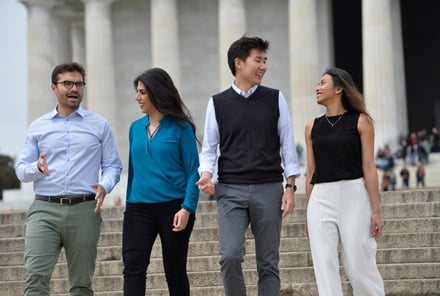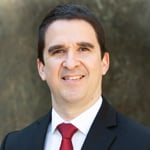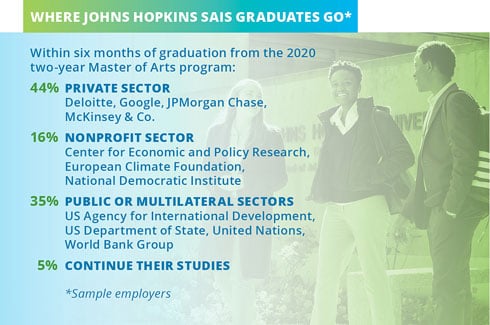2021 Charting a Career Path in Global Affairs
THIS GUIDE IS NO LONGER ACTIVE. For the current FP Guide, click here.
JOHNS HOPKINS UNIVERSITY, SCHOOL OF ADVANCED INTERNATIONAL STUDIES
A Newly Flexible Program for a Changing World

In the 76 years since the Johns Hopkins University School of Advanced International Studies (SAIS) was founded, the world has changed immensely.
To reflect that new reality, SAIS will launch a reimagined Master of Arts in International Relations this fall, with more flexibility and interdisciplinary focus and broader access to opportunities and experiential learning.
The original program “consisted of 19 different programs. It was siloed and relatively inflexible,” says Filipe Campante, vice dean for education and academic affairs at Johns Hopkins SAIS. Students chose a concentration and followed a set path of classes, with opportunities such as internships available only within their chosen area.
The new format and curriculum allow students to design a flexible program, with six core classes and ten electives. Three of those electives are in the same regional area (such as Africa) and three are in a chosen functional area of concentration (such as Technology and Culture or International Economics and Finance).

“In international development today, instead of leaders being schooled in certain disciplines, the world requires a broader approach.” –Filipe Campante, Vice Dean for Education and Academic Affairs, School of Advanced International Studies, Johns Hopkins University
All students, no matter their focus area, now have access to the same opportunities, such as study trips, practicum courses, and internships. These hands-on learning experiences allow each student to better shape their most appealing course of study, with each choosing a capstone, a class-centered group project for a company, or a course focused on a historic battle that ends with a trip to the battle site for a simulation.
“Bringing the experiential part is important in this day and age if we are preparing students for leadership,” Campante says. “We want to break down the barriers between academic knowledge and the professional application of it.”
 The hands-on learning helps satisfy future employers, which place higher value on real-world experience, which is especially important as the global competition for jobs increases. “The market demands you come in with some experience in the application of the knowledge you have acquired,” Campante says.
The hands-on learning helps satisfy future employers, which place higher value on real-world experience, which is especially important as the global competition for jobs increases. “The market demands you come in with some experience in the application of the knowledge you have acquired,” Campante says.
The increased cross-pollination of disciplines also is needed in a world that is not as structured as it was during the Cold War era.
“In international development today, instead of leaders being schooled in certain disciplines, the world requires a broader approach,” Campante says. For example, US–China relations involve more than just military issues; they also encompass cultural, technological, and economic issues. Tackling climate change requires knowledge of science, geopolitics, international development, and economics. The COVID-19 pandemic requires an understanding of science, economics, and politics.
“In this world, you can’t compartmentalize different aspects of global issues,” Campante says.
Contact
http://sais.jhu.edu/fp-mair
[email protected]
+1 202-663-5700 or +1 877-JHU-WASH (US toll-free)
Contents
- 2021 Charting a Career Path in Global Affairs
- George Mason University, Schar School of Policy and Government
- Yale University, Jackson Institute for Global Affairs
- Johns Hopkins University, School of Advanced International Studies
- Princeton University, Princeton School of Public and International Affairs
- Seton Hall University, School of Diplomacy and International Relations
- University of Notre Dame, Keough School of Global Affairs
- Indiana University, Hamilton Lugar School of Global and International Studies
- Texas A&M University, The Bush School of Government and Public Service
- Carnegie Mellon University, Institute for Politics and Strategy